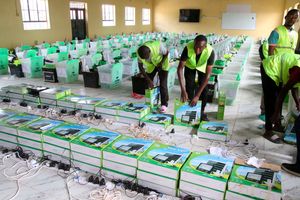When the best are jailed or killed

Former NMG editorial director Joseph Odindo (centre) confers with Konrad Adenauer Stiftung Media Director Christoph Plate (left) and Somali Journalists Syndicate Secretary General Abdalle Ahmed Mumin during the book launch at the Trademark Hotel on March 16, 2021.
What you need to know:
- Reading Hounded, one sees something strange about journalism in most of Africa.
- Journalism is perhaps, the only profession where doing it to perfection is likely to get you in trouble if you are lucky or killed.
On Tuesday, a book edited by former Nation Media Group editorial director Joseph Odindo, Hounded: African Journalists in Exile, was launched in Nairobi. It tells the disturbing story of 16 journalists from 16 African countries who fled persecution, and some the threat of death, in the past 25 years.
I overheard whispers at the launch that some of the stories might be serialised in at least one Kenyan newspaper and a media house in another African country has snapped up the rights to do the same; so, I will not spoil it by spilling snippets here.
The Kenyan story is by Pius Nyamora, who fled the country for the United States in 1994, when the whip was being brought down hard on pro-democracy activists. Nyamora was founder and editor of the feisty Society magazine, having risen to prominence as a parliamentary reporter at the Daily Nation.
From Tanzania comes the tale of award-winning Ansbert Ngurumo, a journalist and blogger living in exile in Sweden, who hightailed it out of the country in 2017. At the time he was managing editor of the weekly MwanaHALISI. The title of one of his books tells you a lot about his proclivity for speaking truth to power. It is John Magufuli: An Epitome of Cowardice.
From Uganda is Kiwanuka Lawrence Nsereko, another stubborn journalist, and war reporter, the kind of fellow some guerrilla leaders liked to talk to. Those kinds of things got him into trouble and he had to take off in 1995. The story of what happened to him in Kenya, before he eventually went to the US, is stuff for the movies.
Years later, Kiwanuka returned to Kenya to wed. I was his best man. I remember heading to the registrar-general’s office on Nairobi’s Harambee Avenue for the ceremony from work at Nation Centre. When I looked at myself in a shop window and realised the tie wasn’t right for the occasion, I stepped into one of those fancy shops nearby and bought an appropriate tie for the occasion, stuffing the one I was wearing in my back pocket.
From Rwanda, Fred Muvunyi, who was chair of the Rwanda Media Commission and worked for various news outfits in the country, tells his story. He is now an editor at Deutsche Welle in Germany.
There are brave women in there too.
Journalism in this our Africa is not for the faint of heart. A little madness, a touch of a death wish, courage, and some usefulness foolishness are necessary.
Ends in tears or death
Reading Hounded, one sees something strange about journalism in most of Africa as in a few other parts of the world. It is, perhaps, the only profession where doing it to perfection is likely to get you in trouble if you are lucky or killed if your chi has deserted you. The only other job I think comes close is being a very good auditor-general, who exposes the fellows stealing taxpayers’ money. That also almost always ends in tears, or death.
African regimes also have a history of reserving the most extreme, and bizarre, treatments for journalists.
In Nigeria, during the military dictatorships of Sani Abacha, and also Ibrahim Babangida, the London-published freedom of expression magazine Index on Censorship used to be a must-read — if only for the strange stories it had on the mistreatment of Nigerian journalists.
One of the most memorable ones was when security officers raided a journalist’s home, arrested him and carted him off to prison along with his wife and children. And just for good measure, they decided to imprison his pets too!
And regimes sure know how to break journalists’ spirits. A good friend and clever journalism graduate school classmate decided to go back to Ethiopia in the last years of the Mengistu Haile Mariam regime. I lost touch but eventually found an opportunity to track him down.
I remember staring at the lampposts in Addis Ababa then, where it was reported that the Mengistu regime often hanged people in the night. In the morning, residents would wake up to the sight of bodies dangling from lampposts as a warning.
On the second day in Addis, I eventually traced him. His office was ajar, and I picked the heavy smell of cigarette smoke from a distance. I pushed the door in and there was a figure hunched over a desk, sitting silently in the room with the curtains drawn — at midday.
I opened the curtains, and it was a startling sight. He was broken. He was dishevelled. He had kicked his shoes off and his toes were sore. It was one of those moments when the best you can do is just hug and sob. We had all believed he would change Ethiopia. But it had crushed him. Maybe he should just have stayed away from journalism.
Hounded is the triumph of the ones who got away, didn’t lose their minds and lived to fight and win one more war.
Mr Onyango-Obbo is a journalist, writer and curator of the Wall of Great Africans. @cobbo3





